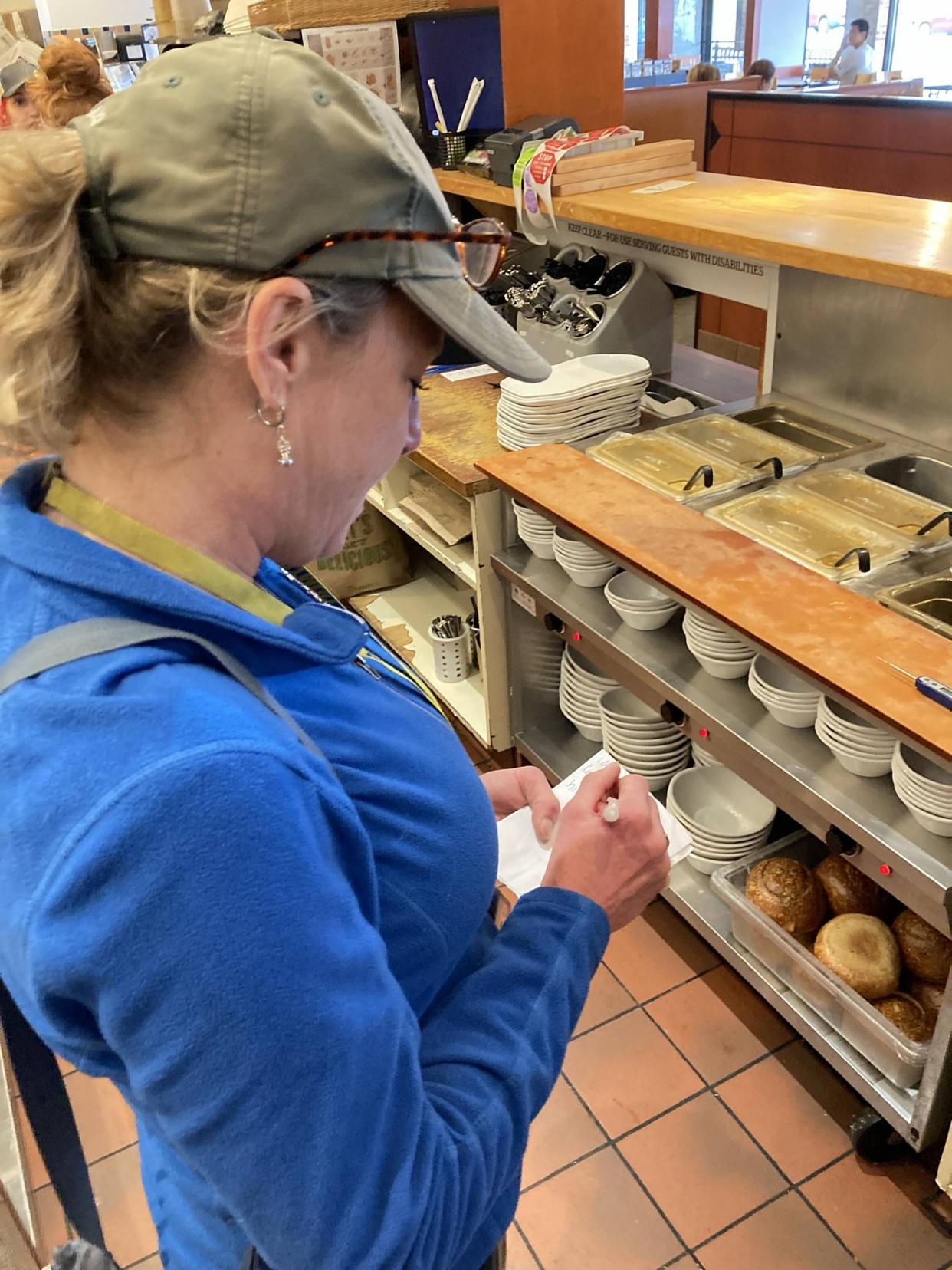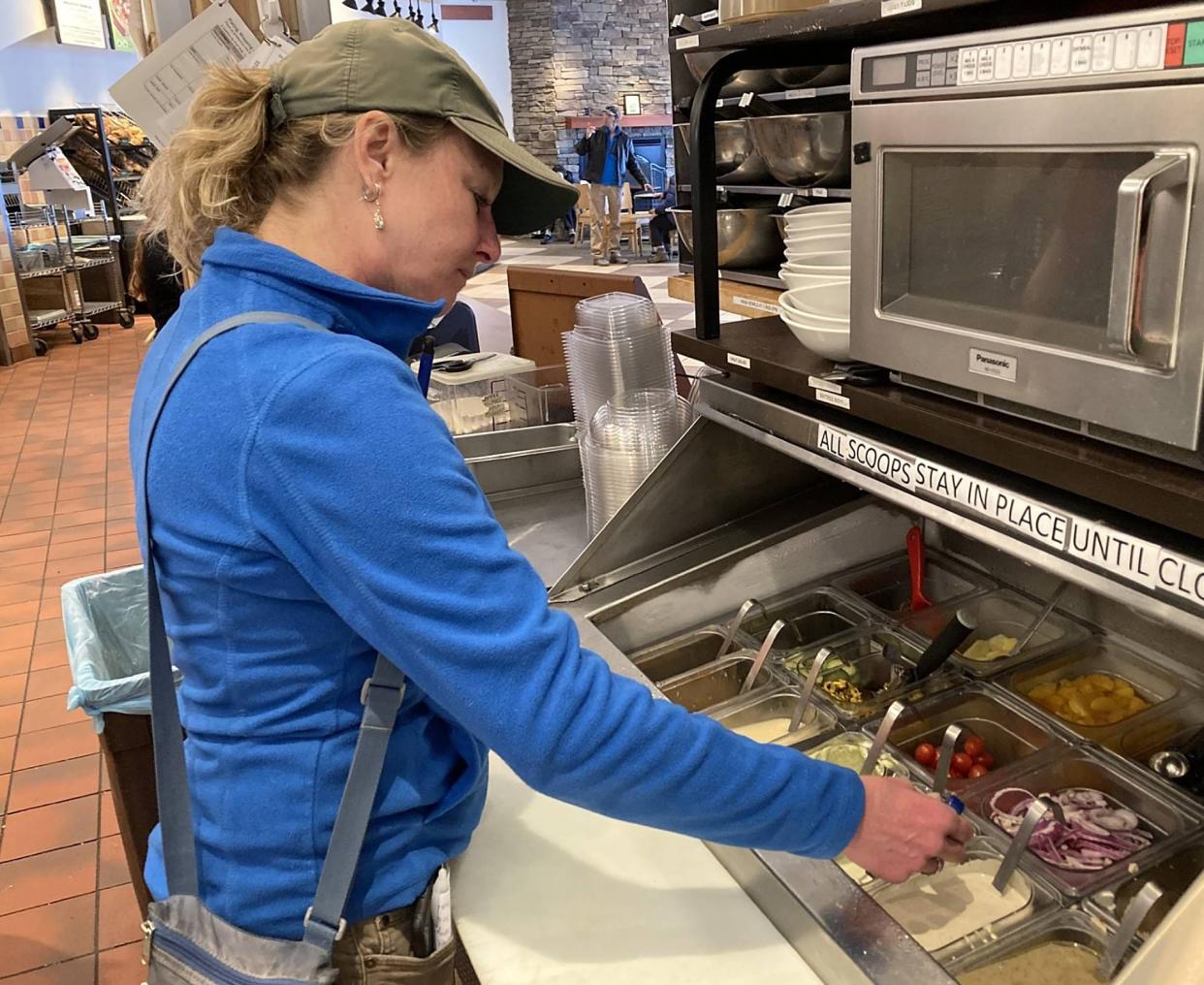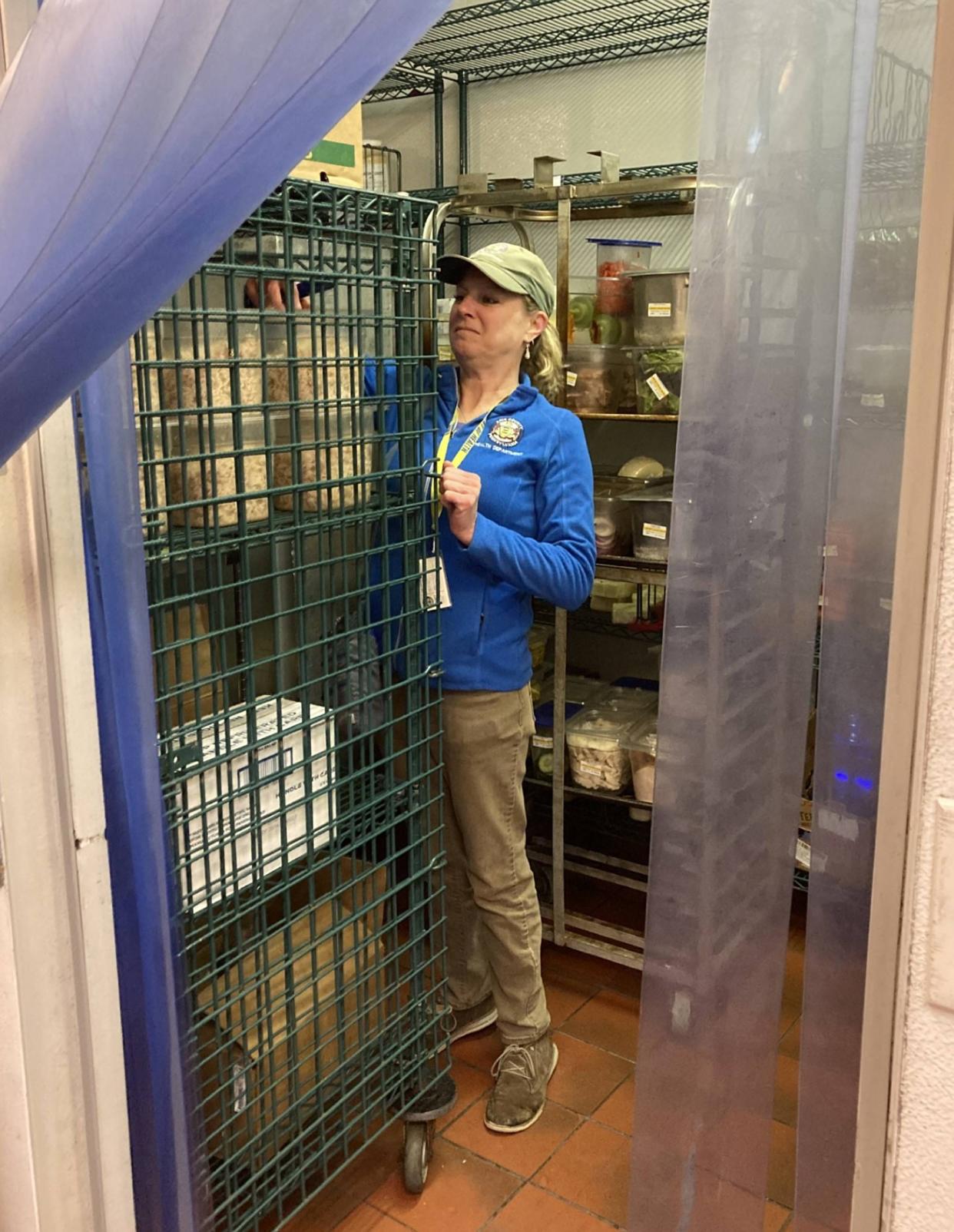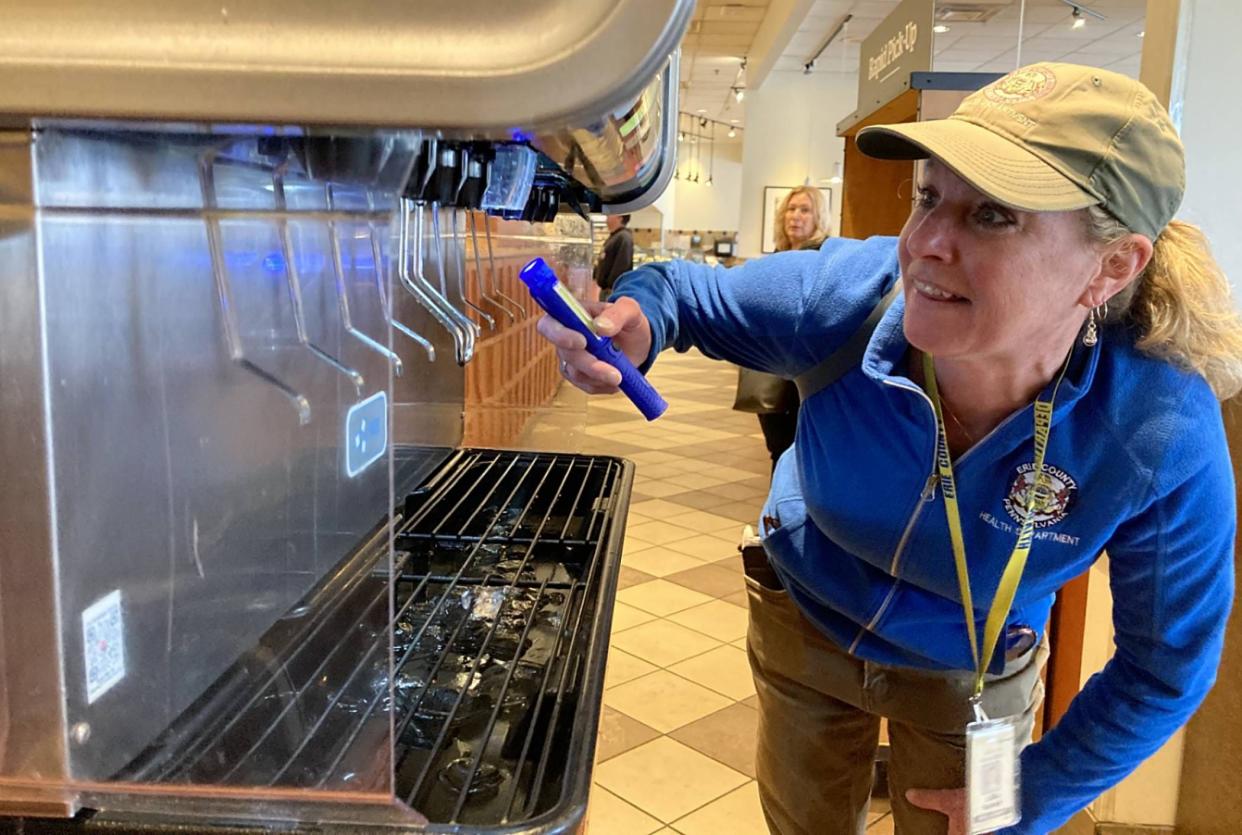'We're not here to play gotcha': Following an Erie County health inspector on the job
ADay in the Life is a new monthly series in which we show some of the area's more interesting jobs and how these people interact with the community.
Lisa Susann carries a folded piece of paper in her pants pocket whenever she inspects a restaurant in her territory of southwestern Millcreek Township.
Other environmental protection specialists use a computer tablet to record notes when they conduct restaurant inspections for the Erie County Department of Health, but Susann jots down all the relevant information onto scrap paper, then transfers it to her tablet after the inspection.
"I'm just old school," said Susann, 48. "It also keeps me from carrying a big clipboard or tablet that could contaminate surfaces if I put it down."

Pennsylvania's county health departments are required at least once a year to inspect every restaurant, grocery store and business that sells unpackaged food. The Pennsylvania Department of Agriculture inspects in counties that don't have their own health department.
Susann is one of 10 environmental protection specialists for the County Health Department. They also inspect public swimming pools, campgrounds and manufactured home parks to ensure public safety.
"Our goal is to work with these facilities and make sure they are keeping the public safe," said Breanna Adams, director of environmental health services for the County Health Department. "We are looking for violations, but we want to be an educational resource for them, too."

Susann arrived at Panera Bread, 2501 W. 12th St., just before its daily lunch rush on April 18. Inspectors don't notify facilities in advance before an inspection.
After talking with the shift manager, Susann walked behind the counter and used one of the three food thermometers she carries to test the temperatures of salad dressings and other cold foods.
"I carry three of them in case one of their batteries dies, I leave one behind, or if someone questions the calibration," Susann said. "I also pack a lot of antiseptic wipes, because I wipe off the thermometer each time to avoid cross contamination."
Taking food temperatures is perhaps the most important job Susann does during an inspection. Illness-causing bacteria can grow in certain foods that aren't kept hot enough (140 degrees or higher) or cold enough (41 degrees or colder).
Panera Bread has a solid reputation for keeping its foods at the proper temperature, Susann said. The only issue was a small drawer cooler filled with cheeses and cut vegetables where the foods reached 47 degrees.
Susann asked to see Panera Bread's temperature logs. A shift manager soon brought her a computer tablet that showed the foods in that drawer cooler were within the proper temperature range just two hours earlier.
"Because they keep the log, they can just move the foods into their walk-in cooler instead of tossing out everything," Susann said. "The logs show the foods were out of temperature just two hours, within the four-hour range that is allowed."
Lessons learned at the three-bowl sink
Once Susann was finished checking behind the counter, she went into the kitchen. She checked the automatic dishwasher to ensure its final rinse reached 180 degrees.
Susann also examined the cutting boards in the three-bowl sink. She felt the grooves with her fingertips.
"Once the grooves are too deep, you can't get them clean," Susann said. "You either then need to replace them or have someone plane them."
The walk-in cooler and freezer were next on Susann's list. Checking the freezer was straightforward: She poked a few foods to make sure they were thoroughly frozen and looked for any spills on the floor and shelves.
Coolers are a bit more complex to inspect. Susann started by checking the temperatures on containers of chicken salad stored by the cooler's door.
"The food by the door will usually be the warmest, with people opening and closing the door all the time," Susann said. "If they are colder than 41 degrees, the rest of the food should be as well."

Susann also checks how the food is stored in the cooler.
Ready-to-eat food should be stored on higher shelves than uncooked pork and fish, which should then be stored above raw beef, which should be above raw chicken and stuffed meats.
"It's so any raw juices from the meats can't drip onto the ready-to-eat foods and contaminate them," Susann said. "And since pork cooks at a lower temperature than chicken, it has to be stored above the chicken."
'We aren't here to play gotcha'
As Susann works her way around the kitchen, a Panera Bread shift supervisor follows her to explain certain practices and answer questions. It's a standard practice that the inspector prefers.
"We aren't here to play gotcha," Susann said. "The health department is looking to work with the facility, and we see this as an educational opportunity."
But sometimes an inspector must cite a facility for violating local regulations or the Pennsylvania Food Code, which is now based on the Food & Drug Administration Food Code.
Violations are divided into two categories: foodborne illness risk factors (used to be known as critical) and good retail practices (used to be known as noncritical). An inspector can force a facility to close temporarily if they can't fix violations that pose an immediate threat to the public health.
"Even when an inspector finds a violation, they are sharing tips and trying to be an educational resource for the facility," Adams said.
After inspecting the kitchen, Susann visits Panera Bread's dining room. The only areas the County Health Department is responsible to inspect are the coffee station, soda machine and bathrooms.

While dirty tables and floors might not be appetizing, they don't pose a serious risk to customers' health, Susann said.
"For the bathrooms, we make sure everything is working, the toilets are flushing and the seats aren't cracked," Susann said.
No violations found at Panera Bread
Susann met briefly with the shift manager after the nearly 90-minute inspection and told her that there were no violations. The inspection's results are posted on the county government website: www.eriecountypa.gov.
Facilities that receive no violations often don't get inspected again for a year, unless there is a complaint. Ones that have multiple or serious violations will get reinspected as soon as the next day.
Susann's only remaining detail for this inspection was transcribing her notes into the County Health Department's computer system. But there are other businesses to visit, as well as other duties like training new coworkers.
"I enjoy trying to keep the public safe and interacting with businesses. I'm a people person," Susann said as she left Panera Bread. "The hardest thing is trying to get through to people who don't want to listen or just don't care."
Contact David Bruce at dbruce@timesnews.com. Follow him on X @ETNBruce.
This article originally appeared on Erie Times-News: Erie County PA Department of Health inspector visits Erie businesses
